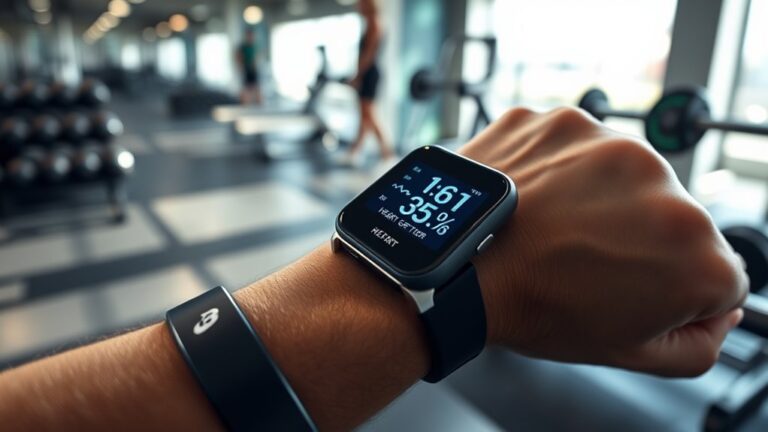The Role of Sleep in Muscle Growth and Gym Performance

Sleep plays an essential role in muscle growth and gym performance. Quality sleep, ideally 7-9 hours, boosts growth hormone production, aiding tissue repair and energy restoration. It also regulates testosterone levels, which are crucial for increasing strength. When you’re sleep-deprived, your performance suffers, leading to decreased strength and higher injury risks. Prioritizing sleep not only enhances recovery but also supports mental health and motivation. There’s more to discover about optimizing your sleep for peak performance.
The Science of Sleep and Muscle Recovery

When you consider how imperative sleep is for muscle recovery, it’s clear that neglecting it can hinder your fitness goals. Your body undergoes various sleep cycles that are key for repairing muscles and replenishing energy. During deep sleep, for instance, growth hormone levels peak, facilitating tissue repair and growth. If you’re not getting enough quality sleep, you’re missing out on this essential recovery process.
Incorporating effective recovery strategies, such as maintaining a consistent sleep schedule and creating a restful environment, can greatly enhance your sleep quality. Aim for 7-9 hours of uninterrupted sleep each night, as this allows your body to cycle through the stages needed for ideal recovery. By prioritizing sleep, you not only boost muscle growth but also improve overall performance. Remember, consistent sleep isn’t just a luxury; it’s an imperative part of your fitness journey.
How Sleep Affects Hormone Levels
Sleep plays an essential role in maintaining hormonal balance, which directly impacts your muscle growth. During deep sleep, your body releases significant amounts of growth hormone, vital for recovery and muscle development. Prioritizing quality sleep can enhance this natural process, maximizing your gains in the gym.
Hormonal Balance During Sleep
Although you might focus on your workout routine and nutrition, the role of sleep in hormonal balance is vital for muscle growth. During sleep cycles, your body undergoes hormonal fluctuations that can greatly impact your performance and recovery. Here’s why prioritizing sleep matters:
- Testosterone Production: Ideal levels increase muscle mass and strength.
- Cortisol Regulation: Lower stress hormones support recovery and growth.
- Insulin Sensitivity: Better sleep enhances nutrient absorption and storage.
- Growth Hormone Release: Sleep is essential for muscle repair and development.
- Overall Well-Being: Improved mood and energy levels foster better workouts.
Growth Hormone Release Timing
While many people underestimate the importance of timing in sleep, it plays a significant role in the release of growth hormone (GH), which is essential for muscle development and repair. Your sleep cycles are critical; the majority of GH is released during deep sleep stages, particularly during the first few hours of your slumber. If you’re cutting your sleep short, you’re also cutting back on GH production, which can hinder your muscle growth and recovery. Aim for consistent sleep patterns to guarantee you’re optimizing these cycles. Prioritize quality sleep and aim for 7-9 hours per night; this way, you create the ideal environment for hormone release, boosting not just muscle growth, but overall gym performance.
The Impact of Sleep Deprivation on Performance

When you skimp on sleep, your athletic performance can take a significant hit, affecting everything from strength to endurance. The effects of sleep deprivation are not just about feeling tired; they can lead to noticeable performance decline. When you’re sleep-deprived, your body struggles to recover and maintain peak function, which can hinder your training progress.
Skimping on sleep can severely impact your athletic performance, hindering both recovery and training progress.
- Decreased reaction time and coordination
- Impaired decision-making abilities
- Lowered strength and power output
- Increased risk of injury
- Poorer endurance and stamina
These sleep deprivation effects create a vicious cycle where your workouts suffer, leading to more frustration and potentially even burnout. Prioritizing sleep is vital for maximizing your gym performance and achieving your fitness goals. Remember, recovery is just as important as training. Don’t underestimate the power of a good night’s sleep!
Sleep Stages and Their Role in Recovery
Understanding sleep stages is essential for your recovery and muscle growth. REM sleep plays an important role in memory consolidation and emotional balance, while deep sleep is fundamental for physical repair and growth hormone release. Prioritizing both stages can greatly enhance your overall performance and recovery.
REM Sleep Benefits
Although you might focus on workouts and nutrition for muscle growth, the significance of REM sleep often gets overlooked. This stage of sleep plays an essential role in your recovery processes, enhancing both physical and mental performance. During REM sleep, your brain engages in vital activities that support your fitness goals.
- Promotes muscle repair through hormone regulation.
- Enhances cognitive restoration, improving brain function.
- Aids in memory consolidation, helping you retain workout knowledge.
- Reduces stress, which can negatively impact your progress.
- Supports ideal sleep architecture, ensuring effective sleep cycles.
Deep Sleep Importance
While REM sleep plays a significant role in muscle recovery and cognitive function, deep sleep is equally crucial for your overall recovery process. During deep sleep cycles, your body undergoes critical repair and growth. This stage triggers the release of growth hormone, which is essential for muscle tissue repair and growth. The deep sleep benefits extend beyond physical recovery; they also enhance your immune function and mental clarity. To maximize your gym performance, prioritize getting sufficient deep sleep. Aim for 1-2 hours of deep sleep each night, as it’s during this time that your muscles recover, adapt, and strengthen. By understanding and optimizing your sleep cycles, you’re setting yourself up for greater gains and improved performance in the gym.
Recommendations for Optimal Sleep Duration

To maximize muscle growth, getting the right amount of sleep is essential. Aim for 7 to 9 hours of quality sleep each night to guarantee your body can effectively recover and build muscle. Understanding your sleep cycles can help you identify the ideal timing for when to hit the hay. Here are some recommendations to keep in mind:
- Prioritize consistent sleep schedules; go to bed and wake up at the same time daily.
- Incorporate a wind-down routine to signal your body it’s time to sleep.
- Avoid caffeine and heavy meals close to bedtime to enhance sleep quality.
- Track your sleep patterns to find what duration works best for you.
- Listen to your body; adjust your sleep duration based on your training intensity.
Tips for Improving Sleep Quality
Improving sleep quality is vital for muscle growth and overall recovery, especially when you’re pushing your limits in training. Start by focusing on sleep hygiene: maintain a consistent sleep schedule, and create a dark, cool, and quiet environment to enhance your rest. Avoid screens at least an hour before bed, as blue light can disrupt your circadian rhythm.
Incorporating relaxation techniques can also greatly improve your sleep. Try deep breathing exercises or meditation to calm your mind after an intense workout. You might also benefit from gentle stretching or yoga, which can relieve muscle tension and prepare your body for sleep.
Prioritize your wind-down routine; consider reading a book or listening to soothing music. Remember, quality sleep is as vital as your gym sessions. By implementing these strategies, you’ll maximize recovery and set yourself up for successful workouts ahead.
The Connection Between Sleep and Nutrition

Quality sleep and proper nutrition are interconnected pillars of muscle growth and recovery. When you prioritize sleep nutrition, you enhance your body’s ability to repair and build muscle. Sleep plays an essential role in hormone regulation, affecting your appetite and metabolism. If you’re not getting enough rest, you might find it harder to make the right food choices, which can hinder your progress.
Prioritizing quality sleep enhances muscle growth and recovery, making it vital for optimal nutrition and performance.
Consider these key points:
- Protein synthesis: Sleep enhances the process of muscle repair using dietary protein.
- Hormonal balance: Growth hormone production peaks during deep sleep, fundamental for recovery.
- Nutrient timing: Consuming nutrients at ideal times supports performance and recovery.
- Cognitive function: Well-rested minds make better dietary decisions.
- Energy levels: Quality sleep boosts your energy, fueling more effective workouts.
Sleep and Mental Health: A Performance Factor
Sleep isn’t just essential for muscle recovery; it plays an important role in your mood and cognitive function as well. When you prioritize quality sleep, you’re not only enhancing your physical performance but also your mental resilience. Understanding this connection can motivate you to make sleep a non-negotiable part of your training routine.
Sleep’s Impact on Mood
While many might focus solely on the physical benefits of sleep, its influence on mood and mental health is equally essential for ideal performance. Quality sleep boosts your motivation and enhances emotional resilience, making it easier to tackle challenges in the gym and beyond. When you prioritize sleep, you’re not just resting your body; you’re also preparing your mind for peak performance.
- Improved mood enhances workout enjoyment.
- Balanced emotions lead to better decision-making.
- Increased motivation drives consistent training.
- Greater emotional resilience helps overcome setbacks.
- Enhanced overall mental health supports long-term goals.
Cognitive Function and Recovery
Although you may not realize it, the state of your cognitive function plays an essential role in how effectively your body recovers after exercise. Mental fatigue can hinder your performance and delay cognitive recovery, making it imperative to prioritize sleep. Quality rest not only enhances memory and focus but also supports muscle repair and growth. To optimize your sleep strategies, establish a consistent sleep schedule, create a calming bedtime routine, and limit screen time before bed. Incorporating these practices can greatly improve your cognitive function, leading to better decision-making and workout efficiency. Remember, a well-rested mind will empower you to push through challenges, ultimately enhancing your gym performance and overall fitness journey.
Adjusting Sleep Patterns for Training Schedules

Adjusting your sleep patterns to align with your training schedule can considerably enhance muscle growth and recovery. By implementing sleep schedule adjustments, you’ll optimize your body’s performance during workouts, leading to better results. Training time synchronization is key to ensuring your muscles are primed and ready for intense sessions.
Consider these practical tips for adjusting your sleep patterns:
- Set a consistent bedtime to regulate your internal clock.
- Create a pre-sleep routine to signal your body it’s time to wind down.
- Limit screen time at least an hour before bed to improve sleep quality.
- Monitor your caffeine intake, especially in the afternoon, to avoid sleep disruptions.
- Prioritize naps if you’re training at unconventional times to recover effectively.
Real-Life Success Stories: Sleep and Fitness Transformations
As you explore the connection between sleep and fitness, you’ll find inspiring real-life success stories that highlight how prioritizing sleep can transform both physical performance and overall well-being. Take Sarah, for instance; after struggling with fatigue during workouts, she decided to focus on improving her sleep quality. Within weeks, she experienced a remarkable fitness transformation, boosting her strength and endurance.
Another compelling example is Mike, who learned that inadequate sleep was hindering his muscle growth. By committing to a regular sleep schedule, he not only enhanced his gym performance but also felt more energized throughout the day. These sleep success stories emphasize that quality rest is essential for recovery and muscle repair, directly impacting your fitness journey.
Frequently Asked Questions
Can Napping Improve Workout Performance and Recovery?
Yes, napping can definitely improve your workout performance and recovery. A post workout nap, ideally lasting 20-30 minutes, can help recharge your energy levels and enhance focus. This short duration prevents deep sleep, which can leave you groggy. By incorporating strategic naps into your routine, you’ll likely notice better endurance and quicker recovery times. So, prioritize those naps; they’re a simple yet effective way to boost your training results!
How Does Sleep Impact Weight Loss During Training?
Sleep’s essential for weight loss during training because sleep deprivation can greatly lower your metabolic rate. When you don’t get enough rest, your body struggles to regulate hunger hormones, making it harder to resist cravings and stick to your diet. Prioritizing quality sleep helps maintain a healthy metabolism, enhancing your weight loss efforts. So, if you’re serious about shedding pounds, make sure you’re getting enough sleep—it’s a critical part of your training regimen!
Does Caffeine Affect Sleep Quality and Muscle Growth?
Caffeine can greatly affect your sleep quality, especially if consumed too close to bedtime. Poor sleep duration can hinder muscle recovery and growth, limiting your gym performance. To maximize benefits, consider your caffeine timing; aim to consume it early in the day. Prioritizing quality sleep not only enhances muscle growth but also boosts your overall training efficacy. Staying mindful of these factors will help you achieve your fitness goals more effectively.
Is It Possible to “Catch Up” on Lost Sleep?
Think of sleep like a bank—you can’t just withdraw all at once after a spree of sleep deprivation. While you might feel recovered after a few long nights, it won’t fully erase the effects of lost sleep. Recovery techniques, like napping or maintaining a consistent schedule, can help. So, while you can improve your sleep quality, it’s better to prioritize regular sleep rather than trying to catch up all at once.
How Do Sleep Disorders Influence Gym Performance?
Sleep disorders can greatly impact your gym performance. When you’re dealing with sleep deprivation effects, you may find your energy levels drop and your focus wanes. Insomnia consequences like mood swings and fatigue can lead to reduced motivation and intensity during workouts. To optimize your performance, addressing these sleep issues is essential. By prioritizing quality rest, you’ll not only enhance your gym results but also support overall well-being and recovery.





